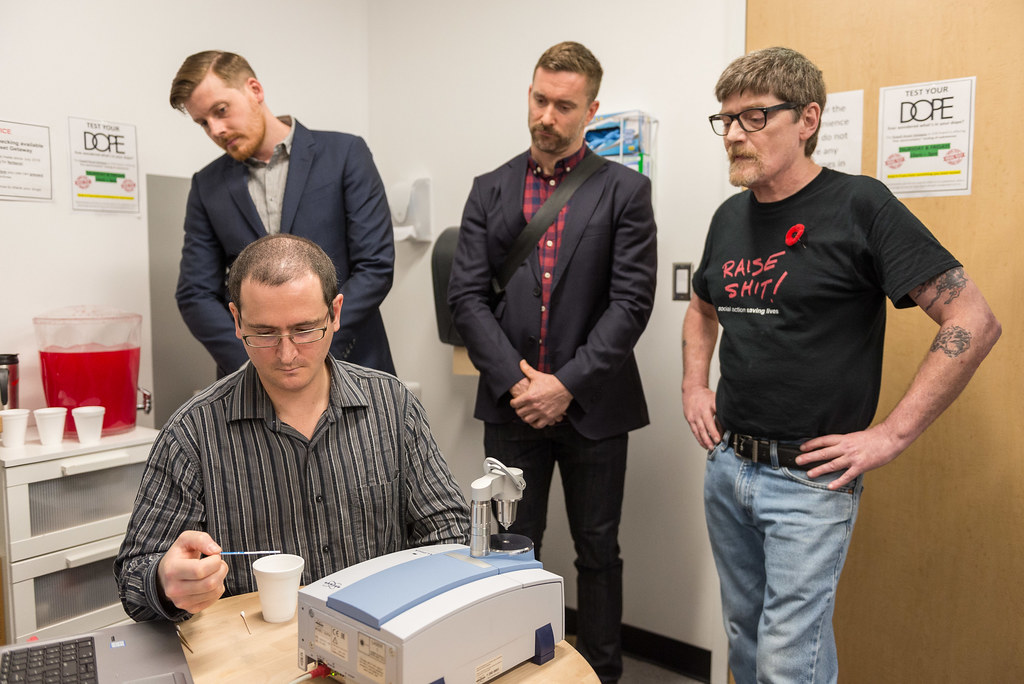Last week, New Zealand became the first country in the world to create legal protections for drug checking, a practice which allows individuals or organizations to test illicit drugs for dangerous contaminants.
A number of other countries, including the Netherlands and Portugal, have informal drug checking structures in place, and drug checking organizations are common around the world, including in New Zealand and the US. But they have generally operated in legal gray areas, without government support.
“So this national reform that protects both the service providers and the substance users, and allocates national funding for implementing the expanding services… that is a whole nother level,” said Hannah Procell, the policy change coordinator for DanceSafe, a US-based organization that conducts drug checking and educates people about drug use.
The New Zealand law does not limit drug checking to music festivals or events, where the practice most often occurs. Last month, the government pledged $800,000 of government funding to support drug checking services and provide information about safe drug use. Advocates hope that the funding and the new law will allow drug checking providers to expand into more vulnerable communities.
“This new law provides a great opportunity to expand availability of services to more vulnerable communities,” said the NZ Drug Foundation’s executive director Sarah Helm in a press statement. “This health service shouldn’t just be for festival goers.”
In April, New Zealand had temporarily legalized drug checking, but the new law permanently legalizes the practice. Not everyone supported the change. New Zealand’s National party opposed the bill and the party’s Justice spokesperson Simon Bridges advocated instead for a “Just say no” approach.
“The only message that really stops fatalities is that no pill is safe,” said Bridges in Parliament. “There’s no such thing as a safe ecstasy or a safe dose of some of the other drugs that may in time be able to be tested.”
But a number of studies have shown that drug checking can reduce risky behavior among drug users, and doesn’t encourage people to start using illegal drugs. A 2021 report from Victoria University found that 68 percent of people surveyed reported changing their drug-using behavior after using drug checking services, and 87 percent of those said their knowledge of harm reduction had improved.
A separate report from an Australian music festival found that of 170 substances tested, seven “MDMA” pills contained potentially deadly contaminants. Every individual who was informed that their pill contained this contaminant discarded their drugs.
Proponents of drug checking argue that the practice saves lives and reduces overdose rates. New Zealand health minister Andrew Little said evidence showed that drug checking keeps people safe. Procell compared drug checking to condoms, arguing that both are ways of mitigating risk from practices — sex and drug use — that people will always engage in.
“Drug checking is a public health strategy, which can achieve the goal of reducing overdose rates and overdose fatalities,” explained Procell. “It’s a proven effective idea that sees positive public health outcomes.”
Little, New Zealand’s health minister, said that last summer, 40 percent of the MDMA tested by drug checking organizations was found to be eutylone, “a potentially dangerous synthetic cathinone also known as bath salts, and linked to deaths and hospitalizations.”
A number of high-profile drug overdoses due to contaminated substances in Australia and New Zealand led to calls for the legalization of drug checking. Now, Procell and other activists hope that New Zealand can be a model for legislation in other countries.
“It’s really impactful to see a national leader support this type of public health approach, to put funding behind it, and to act as an example for other countries to follow suit,” said Procell. “That is something that I really hope we do see in the United States, because we’re not there yet.”

Happiness, Sold by the Piece
Three generations in, Economy Candy endures by honoring its roots while evolving with a changing Lower East Side.







